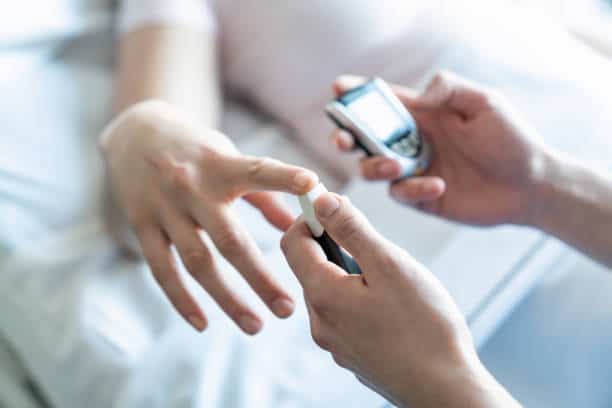Diabetes is a serious health condition that affects millions of people around the world. It can cause life-threatening complications and can even lead to death if left untreated. Unfortunately, it’s not always easy to spot the signs of diabetes early on. That’s why it’s important to be aware of the common symptoms and know when it’s time to seek medical attention. In this article, we’ll discuss six early signs of diabetes that you should watch out for.
What is Diabetes?
Diabetes is a chronic medical condition that affects how the body metabolizes sugar. It occurs when the body does not produce enough insulin or does not use it correctly. Diabetes can lead to serious health complications and even death if left untreated.
Early signs of diabetes may be subtle and go unnoticed. However, there are some common warning signs to watch out for that could indicate diabetes. These include increased thirst, frequent urination, blurred vision, fatigue, and weight loss or gain. Diabetes can also cause wounds to heal slowly and increase the risk of skin infections.
It’s important to recognize these symptoms early on so that you can take steps to manage your diabetes and reduce the risk of developing more serious complications down the line. If you notice any of these symptoms or have a family history of diabetes, it’s best to speak with your healthcare provider for an evaluation.
Unusual Weight Loss Or Gain
Unexplained weight loss or sudden, drastic weight gain can both be signs of diabetes. Someone who is experiencing diabetes may lose weight even when they’re eating more than usual. This is because the body is unable to properly absorb glucose, and so calories are not being converted into energy as efficiently. If you notice that your weight has suddenly dropped without explanation, it could be a sign of diabetes.
On the other hand, if someone with diabetes hasn’t been able to regulate their blood sugar levels, they may also experience sudden and drastic weight gain. This is because the body starts converting excess glucose into fat for storage instead of using it for energy. If you’ve noticed a significant change in your weight without explanation — either losing or gaining too much — it could be a sign of diabetes.
If you think you’re exhibiting any of these signs, it’s important to consult with your doctor and get tested as soon as possible. Early detection and treatment can help prevent serious health complications associated with diabetes down the line.
Excessive Urination
Moving on, excessive urination is another early sign of diabetes that shouldn’t be ignored. People with diabetes often find themselves needing to go to the bathroom more frequently than usual. This is because when glucose builds up in your bloodstream, it causes more fluid to be pulled from your body’s tissues and into the bloodstream, resulting in frequent trips to the restroom.
In addition to needing to go more often, people with diabetes may also notice they are producing larger amounts of urine each time they visit the bathroom. This happens because there is an increased amount of glucose in their blood, which their kidneys must filter out and eliminate. This leads to a greater production of urine as the kidneys work overtime trying to get rid of all the extra glucose.
Finally, people with diabetes may experience a feeling of urgency when it comes time for them to use the restroom – even if they don’t necessarily need to go. This can be caused by nerve damage or dehydration due to increased urination and should not be overlooked as it can lead to further health complications. By recognizing these signs and seeking medical advice, you can take steps in managing your condition before it progresses further.
Increased Thirst And Appetite
One of the earliest signs that may indicate diabetes is an increased thirst and appetite. If you find yourself drinking more than usual, or feeling hungry all the time, these could be signs of diabetes. It’s important to note that this symptom is not exclusive to diabetes, but it can point to other health issues as well.
Another sign is frequent urination. When your body isn’t able to process sugar properly, it leads to a buildup of sugar in your blood and urine. Your body will try to get rid of that excess sugar by releasing more urine than normal. This can lead to dehydration and excessive thirst, so if you’re having trouble staying hydrated, it could be a sign of diabetes.
It’s also important to pay attention to any changes in your weight. People who have diabetes often experience rapid weight loss due to their bodies’ inability to process glucose properly. This can lead to fatigue and irritability, so if you’ve noticed your energy levels dropping recently, it could be worth speaking with your doctor about getting tested for diabetes.
Keep an eye out for any changes in how much you’re drinking and eating; if you notice anything out of the ordinary, make sure you talk to a doctor as soon as possible. Early detection is key when it comes to managing diabetes effectively; don’t wait until its too late!
Blurry Vision
Another common symptom of diabetes is blurry vision. Blurry vision can be an early sign of diabetes, and it is important to recognize it and act quickly. This symptom can happen for a variety of reasons, including changes in blood sugar levels or fluid retention. In order to diagnose this symptom correctly, seeing an eye care professional is essential.
Diabetic blurred vision can come on suddenly or gradually over time. The severity may range from mild to severe and can affect one or both eyes. It can include difficulty seeing at night or reading small print, as well as seeing halos around lights and double vision. It is important to tell your doctor about any changes in your vision, even if they seem minor.
If you experience blurry vision that persists for more than a few days, it’s best to schedule an appointment with your eye doctor as soon as possible. They will be able to examine the back of your eyes and determine if there is any damage due to diabetes-related high blood sugar levels. From there, they will recommend the best course of action for managing the condition.
Fatigue And Weakness
Fatigue and weakness are two signs that can indicate diabetes. People with diabetes often feel very tired and weak, even after they have had enough rest. This is because their bodies are unable to process the sugar from food properly.
When the body cannot break down glucose for energy, it has to work harder than normal to function. This can lead to exhaustion and a feeling of being worn down on a daily basis. It’s important to note that fatigue can be caused by other conditions as well, so if you’re experiencing persistent fatigue it’s best to get checked out by a doctor.
People with diabetes may also experience weakness in their muscles. This is because the body isn’t getting enough energy from glucose, so muscles don’t have the strength they need for everyday activities like walking or carrying groceries. Weakness can be more noticeable in the legs and feet but may also affect other parts of the body.
It’s important to pay attention to how you’re feeling and take action if you think something might be wrong. Talk to your doctor if you experience any of these symptoms: unexplained exhaustion, muscle weakness, or feelings of unwellness that don’t go away with rest.
Slow Healing Wounds
Slow healing wounds can also be an early sign of diabetes. If you find yourself having cuts, scrapes, and bruises that take a long time to heal or continue to open up after they should have closed, it’s a good idea to talk to your doctor. This could be an indication that your body is not getting enough nutrients to heal itself in a timely fashion.
Another symptom of diabetes is dry skin. Diabetes can affect the body’s ability to produce natural oils and keep skin hydrated. It’s important to pay attention to any changes in your skin texture or color, as well as any rashes or patches of dryness that don’t seem to go away with moisturizer or other treatments.
Nerve damage can also be an early sign of diabetes. Those who have diabetes may experience tingling sensations in their hands and feet, as well as numbness or burning sensations in those areas. In addition, some people with diabetes may have difficulty maintaining balance when walking or standing for long periods of time due to nerve damage caused by the disease.
If you are experiencing any of these symptoms, it’s important to speak with your doctor right away so they can help diagnose the cause and provide the appropriate treatment plan for you.
How Is Diabetes Diagnosed?
Typically, an individual will first undergo a physical examination and provide their medical history to their doctor. During this physical exam, the doctor may look for symptoms associated with diabetes such as excessive thirst or frequent urination. They may also take blood samples to measure glucose levels in order to determine whether they are elevated enough to indicate the presence of diabetes.
Another common test used in diagnosing diabetes is the A1C test. This involves taking a sample of blood and measuring how much glucose it contains over time. A high level of glucose in the blood sample indicates that an individual has either prediabetes or type 2 diabetes. On the other hand, if a low level of glucose is found, then it could indicate type 1 diabetes or gestational diabetes during pregnancy.
What Lifestyle Habits Can Help Prevent Diabetes?
Eating a balanced diet is key when it comes to battling diabetes. Eating foods low in fat, sugar and salt, and focusing on healthy carbohydrates, like whole grains and legumes, can go a long way toward preventing or managing the disease. It is also important to watch portion sizes and avoid overeating. Additionally, getting regular physical activity can help regulate blood glucose levels by allowing the body to use glucose more efficiently.
It’s essential to take care of your body if you want to lower your risk of developing diabetes or manage existing conditions effectively. Eating well-balanced meals, exercising regularly and managing stress are all great ways to protect yourself from this serious disease.
What Medications Are Used To Treat Diabetes?
There are several medications available to help manage diabetes, including oral medications, insulin therapy, and injectable GLP-1 receptor agonists. One such GLP-1 receptor agonist is Trulicity, which is indicated for the treatment of type 2 diabetes.
Trulicity works by increasing insulin secretion, reducing glucose production in the liver, and slowing down the rate at which food is absorbed in the stomach. Trulicity is administered once a week via injection and has been shown to be effective in reducing A1C levels in people with diabetes. However, it’s important to note that Trulicity may not be suitable for everyone and should only be used under the guidance of a healthcare provider.
Conclusion
The key to living well with diabetes is to be aware of the signs and symptoms and take action to manage it. Diabetes can be managed through lifestyle changes, such as eating healthy, exercising regularly, and maintaining a healthy weight. Medications may also be used to help control blood sugar levels.
It’s important to remember that diabetes cannot be cured but it can be managed. It’s important to talk with your doctor about any concerns you have about your health. They can provide advice on how best to manage your diabetes for long-term success.
Living with diabetes doesn’t mean that life has to stop. With the right support, education, and care, you can still live an active and fulfilling life. It’s important to stay informed and proactive when managing diabetes so that you can continue living a healthy life.


















